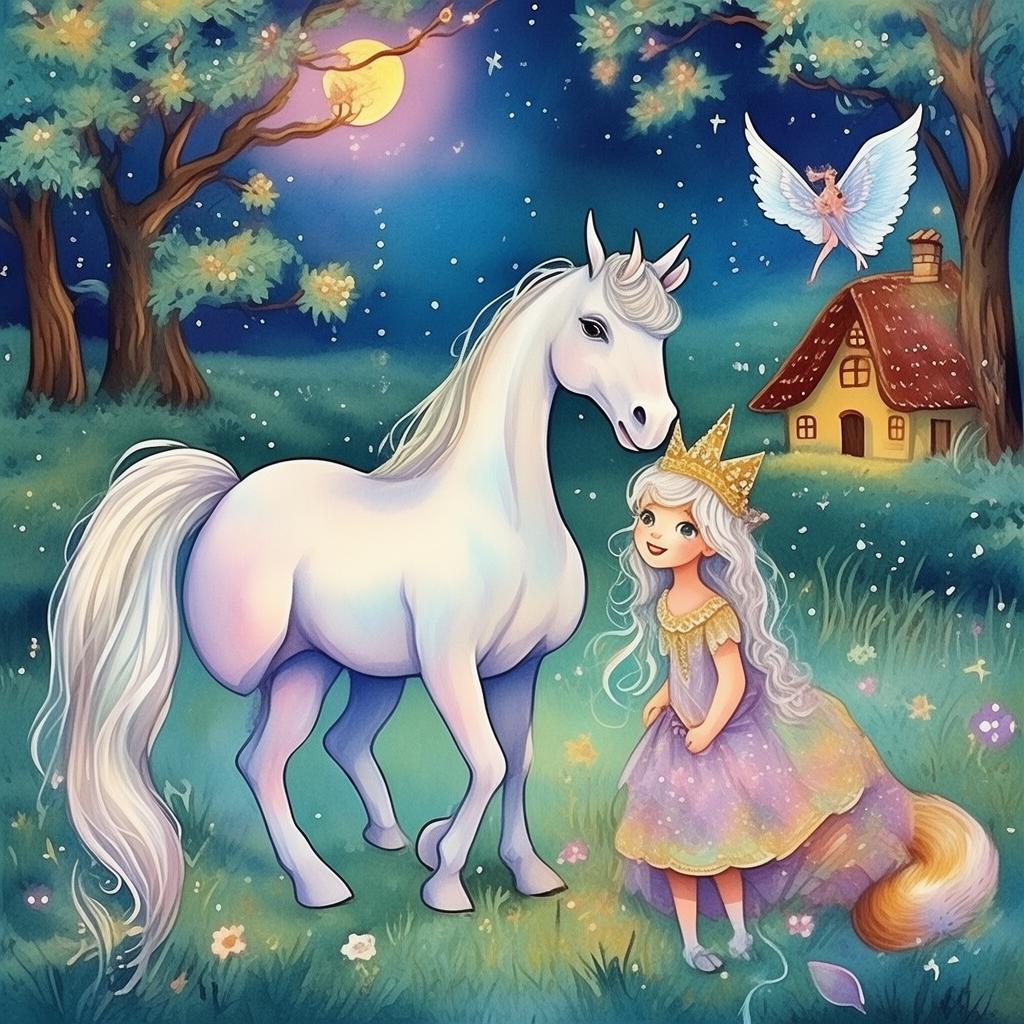The Echoing Melody of Time: A Tale of the Celestial Bard
In the heart of the ancient, mystical realm of Elysia, where the skies wept stars and the earth sang songs of the old, there was a bard known far and wide as the Celestial Bard. His name was Lyricus, a name whispered in reverence by those who heard him play. But behind the melodies that enchanted the heavens, Lyricus harbored a secret as vast as the universe itself.
One moonlit night, while traversing the enchanted forests of Elysia, Lyricus stumbled upon a peculiar instrument—a lyre, whose strings shimmered with the iridescence of a thousand suns. The instrument, hidden in a clearing, was surrounded by a circle of ancient runes that whispered tales of time, destiny, and the very fabric of existence. Curiosity piqued, Lyricus reached out and plucked a string, releasing a melody that vibrated through the cosmos.
The melody was unlike any other; it was the God's Melody of Time, a melody said to be the essence of life's eternal dance. As the music filled his senses, Lyricus felt the passage of time around him slow, and he realized the lyre's power was not just to play music but to control time itself.
Lyricus became consumed by the instrument's allure, spending days and nights delving into its mysteries. With each passing day, he learned to bend time, to see moments before and after, and to grasp the threads of fate that wove the tapestry of life. But with this power came a responsibility that Lyricus never anticipated.
The lyre's magic drew the attention of the ethereal beings that lived in Elysia, beings of light and shadow, love and betrayal. Among them was a beautiful and enigmatic figure known as Aria, the Celestial Bard's former lover. Long ago, Lyricus and Aria had shared a passionate love, one that transcended time and space. However, their love was forbidden, and when Aria was banished by the celestial council, Lyricus was forced to choose between his heart and his duty as a celestial bard.
As Lyricus grew more powerful, his longing for Aria grew stronger, and he found himself torn between the desire to reunite with her and the fear that doing so would unravel the very fabric of reality. One night, in a moment of weakness, he used the lyre to travel back in time, to a place where Aria still lived and loved.
The meeting was a bittersweet affair. Aria, unaware of Lyricus's true identity or his connection to the lyre, welcomed him with open arms, only to learn the truth moments later. The revelation was a devastating blow, and as Aria's love for Lyricus was waning, it became clear that the lyre was not just a source of power but a catalyst for love and betrayal.
The celestial council, noticing the chaos caused by the lyre's misuse, intervened, and Lyricus was faced with a choice: use the lyre to escape the celestial realm or remain with Aria and face the consequences of their love. Knowing that his love for Aria would only lead to more pain and suffering, Lyricus chose to leave her behind.
With the lyre in hand, Lyricus returned to the celestial realm, his heart heavy with sorrow. But the power of the lyre was not meant to be wielded lightly. As he played the melody once more, the fabric of time began to unravel, threatening to consume the entire universe.
Desperate to save the cosmos from destruction, Lyricus sought the aid of his friends and allies. Among them was a wise old sage named Chronos, who had been a mentor to Lyricus in the art of time manipulation. Chronos revealed to Lyricus that the lyre was not just a magical instrument but a living entity, one that could only be mastered by a soul pure enough to face its own darkness.
To save the universe, Lyricus must confront the shadows within himself, the darkest corners of his soul where the seed of his forbidden love had taken root. In a battle that would span the breadth of time itself, Lyricus faced his own inner demons, learning to embrace his power without becoming its slave.
With the help of Chronos and the celestial council, Lyricus managed to seal the lyre's power, ensuring that no one else could misuse it. The universe was saved, but at a great cost. Lyricus's love for Aria had been his undoing, and now he must live with the consequences of his actions.

In the aftermath, Lyricus found solace in his music, the melodies of the lyre still echoing in his mind. He understood that the true power of the lyre was not to control time but to understand it, to learn from its cycles, and to appreciate the fleeting moments that make up our lives.
And so, the Celestial Bard Lyricus continued to play his music, his melodies reaching the stars and resonating with the essence of time itself. Though his love for Aria remained unrequited, he found peace in the knowledge that the universe was safe, and that his music would live on for eternity.
In the end, the Echoing Melody of Time was a tale of love, betrayal, and the eternal struggle between destiny and the human heart. It was a reminder that power, like time, is a delicate balance, one that must be cherished, respected, and wielded with care.
✨ Original Statement ✨
All articles published on this website (including but not limited to text, images, videos, and other content) are original or authorized for reposting and are protected by relevant laws. Without the explicit written permission of this website, no individual or organization may copy, modify, repost, or use the content for commercial purposes.
If you need to quote or cooperate, please contact this site for authorization. We reserve the right to pursue legal responsibility for any unauthorized use.
Hereby declared.









